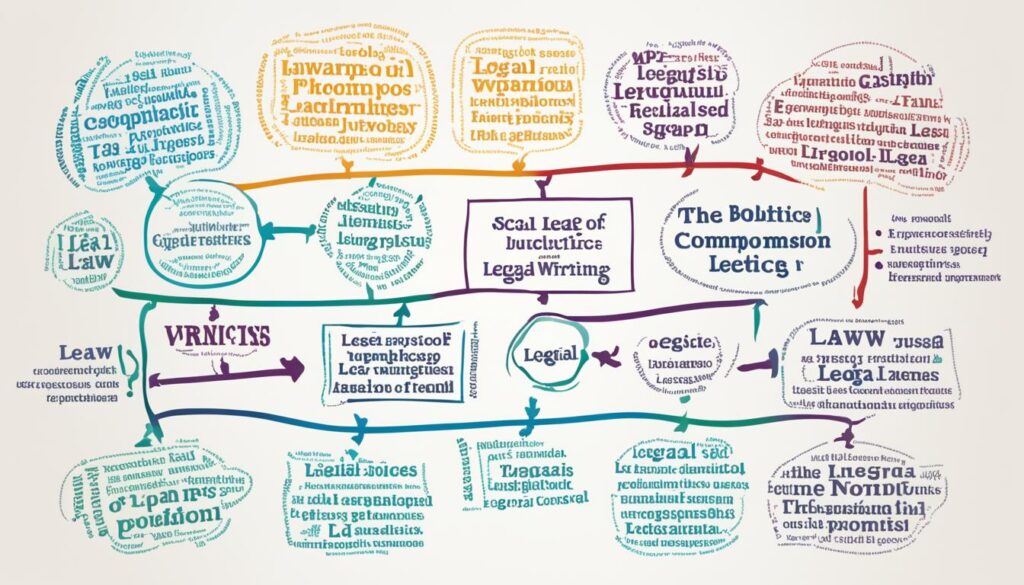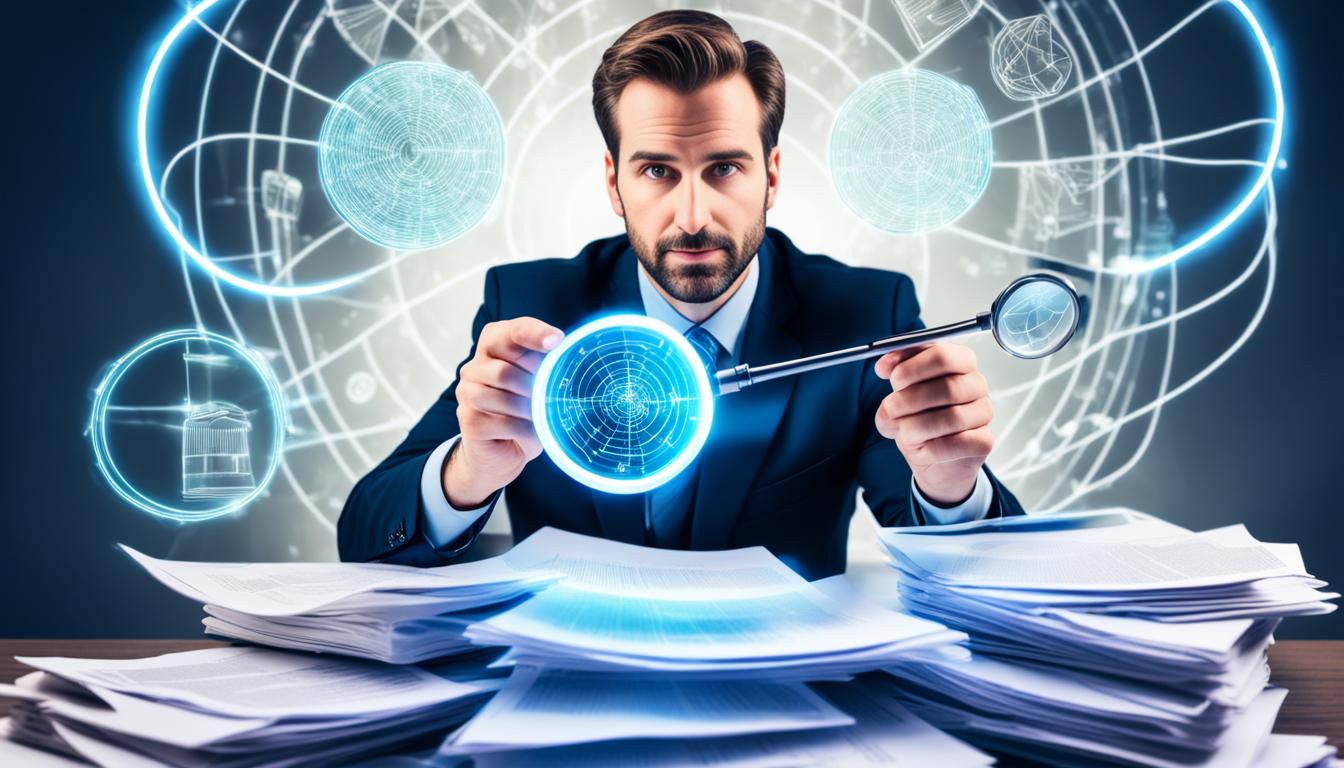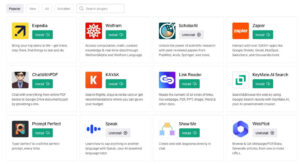Did you know that artificial intelligence (AI) is revolutionizing the legal industry? With the advancement of technology, lawyers now have access to powerful tools that can significantly enhance their efficiency and productivity. One such tool is ChatGPT, the virtual assistant for legal professionals. By using tailored prompts, lawyers can leverage the power of natural language processing (NLP) to streamline their workflow and optimize their legal processes.
ChatGPT offers a wide range of use cases for lawyers, allowing them to perform research, draft legal documents, provide legal information to clients, automate tasks, and conduct secondary research for cases. It acts as a virtual research assistant, providing quick and accurate responses to legal queries. However, it’s important to note that ChatGPT has its limitations and should not replace human expertise, critical thinking, and soft skills.
In this article, I will explore the various use cases of ChatGPT for lawyers and provide examples of effective prompts to maximize its efficiency. I will also discuss the importance of crafting tailored prompts and offer tips on how to write them effectively. Let’s dive into the world of AI-powered legal assistance and discover how ChatGPT can revolutionize the way lawyers work.
Use Cases of ChatGPT for Lawyers
ChatGPT, the AI chatbot developed by OpenAI, offers a plethora of use cases for lawyers to optimize their workflow and enhance efficiency. By leveraging the power of ChatGPT, legal professionals can revolutionize their daily tasks and streamline their legal processes.
1. Research and Writing
ChatGPT can assist lawyers in conducting research and writing legal documents more efficiently. By using AI-generated prompts, lawyers can access relevant legal information, analyze precedents, and draft persuasive arguments. This not only saves valuable time but also ensures accuracy and thoroughness in legal documentation.
2. Simplifying Complex Concepts
Lawyers often need to communicate complex legal concepts to clients in a simplified and understandable manner. ChatGPT can summarize intricate legal cases and explain complex concepts using plain language, ensuring that clients grasp the key aspects of their legal situation. This feature improves client comprehension and enhances communication between lawyers and their clients.
3. Answering Common Legal Questions
Lawyers receive numerous common legal questions from clients on a regular basis. ChatGPT can provide lawyers with pre-generated responses to frequently asked questions, allowing them to quickly address client concerns. This feature saves time and enables lawyers to provide immediate answers, improving client satisfaction.
4. Automation of Tasks
ChatGPT can automate repetitive tasks such as contract drafting and document review. Instead of spending hours on mundane tasks, lawyers can use ChatGPT to generate standard legal documents, review contracts for potential issues, and ensure compliance. This automation frees up valuable time for lawyers to focus on more strategic and critical aspects of their practice.
5. Conducting Secondary Research
When working on a case, lawyers often need to conduct extensive research to gather supporting evidence or explore legal precedents. ChatGPT can assist lawyers in conducting secondary research by providing a starting point and suggesting relevant sources. Lawyers can use these AI-generated prompts to save time and streamline their research process.
It is important to note that while ChatGPT offers numerous benefits for lawyers, its knowledge is limited to information available up until 2021. Recent updates and changes in law may require verification through other reliable sources. Moreover, the expertise and critical thinking of human lawyers remain essential in making informed legal decisions.
By effectively utilizing ChatGPT, lawyers can optimize their workflow, save time, and provide enhanced legal services to their clients.
How to Write Effective ChatGPT Prompts
To get the best results from ChatGPT, lawyers need to craft effective prompts. By following certain guidelines, you can ensure that ChatGPT generates accurate and relevant information for your legal writing needs.
- Assign a role: Give ChatGPT a specific role, such as “act as my opposing counsel” or “assist with contract drafting.”
- Provide context and desired outcomes: Clearly explain the case or task at hand, including any specific details or desired outcomes you want ChatGPT to address.
- Ask follow-up questions: If the initial response from ChatGPT requires more information or clarification, ask follow-up questions to guide it in providing a more accurate and comprehensive answer.
- Request sources to be cited: When requesting information or answers, ask ChatGPT to cite relevant legal sources to ensure credibility and accuracy.
- Edit and verify responses: After ChatGPT generates a response, carefully edit and verify the content for accuracy and consistency with legal principles and norms.
By following these steps, you can harness the power of ChatGPT’s legal text generation capabilities while maintaining control over the accuracy and integrity of the output. Remember, it is essential for lawyers to play an active role in reviewing and refining the AI-generated content according to their professional judgment.
“Using tailored prompts, lawyers can optimize their use of ChatGPT and enhance their legal writing efficiency and productivity.”
For additional guidance on interacting with ChatGPT, Josh Kubiki’s guide follows a similar model called the 5 Ps: Prompt, Provide context, Pose questions, Specify sources, and Modify output. This framework can further assist you in getting the most out of ChatGPT for legal writing purposes.

| Prompts | Examples |
|---|---|
| Prompt 1 | “Please provide an analysis of the legal arguments in support of my client’s position in this case.” |
| Prompt 2 | “Act as my opposing counsel and present counterarguments to the plaintiff’s claims.” |
| Prompt 3 | “Assist me in drafting a contract clause that addresses liability and indemnification.” |
| Prompt 4 | “Summarize recent case law on intellectual property infringement.” |
Conclusion
Artificial intelligence, such as ChatGPT, offers lawyers a powerful tool to enhance their efficiency and productivity. By utilizing tailored prompts, legal professionals can leverage ChatGPT for various tasks, including legal research, document drafting, client interactions, and marketing. While it’s important to note that ChatGPT cannot replace human lawyers and has its limitations, it can be a valuable asset in saving time on repetitive tasks and filling skill gaps in marketing strategies while streamlining legal research processes.
However, it’s crucial to use ChatGPT responsibly. Lawyers must verify the outputs generated by the AI system and exercise critical thinking to ensure accuracy and reliability. Incorporating AI tools like ChatGPT can revolutionize the legal industry, providing new opportunities for law firms to improve their services and stay ahead in a rapidly changing landscape.
With the potential to transform legal workflows, artificial intelligence for lawyers, along with the use of legal chatbot prompts, opens doors to increased efficiency, reduced workload, and improved client satisfaction. By embracing these technological advancements and combining them with human expertise, legal professionals can take advantage of the benefits AI offers while continuing to provide high-quality legal services.
FAQ
What are the use cases of ChatGPT for lawyers?
Does ChatGPT provide up-to-date legal information?
How can lawyers write effective prompts for ChatGPT?
Can ChatGPT replace human lawyers?
How can ChatGPT enhance the efficiency of law firms?
Source Links
- https://www.onthemap.com/blog/chatgpt-for-lawyers/
- https://www.geeksforgeeks.org/chatgpt-prompts-for-maximizing-legal-research-efficiency/
- https://www.clio.com/blog/chat-gpt-prompts/
- Top 8 Finance AI Tools for Smart Money Management - April 13, 2024
- Top AI Tools for Stock Trading: Unveil Profits - April 13, 2024
- 8 Best AI for Homework: Streamline Your Studies - April 13, 2024








